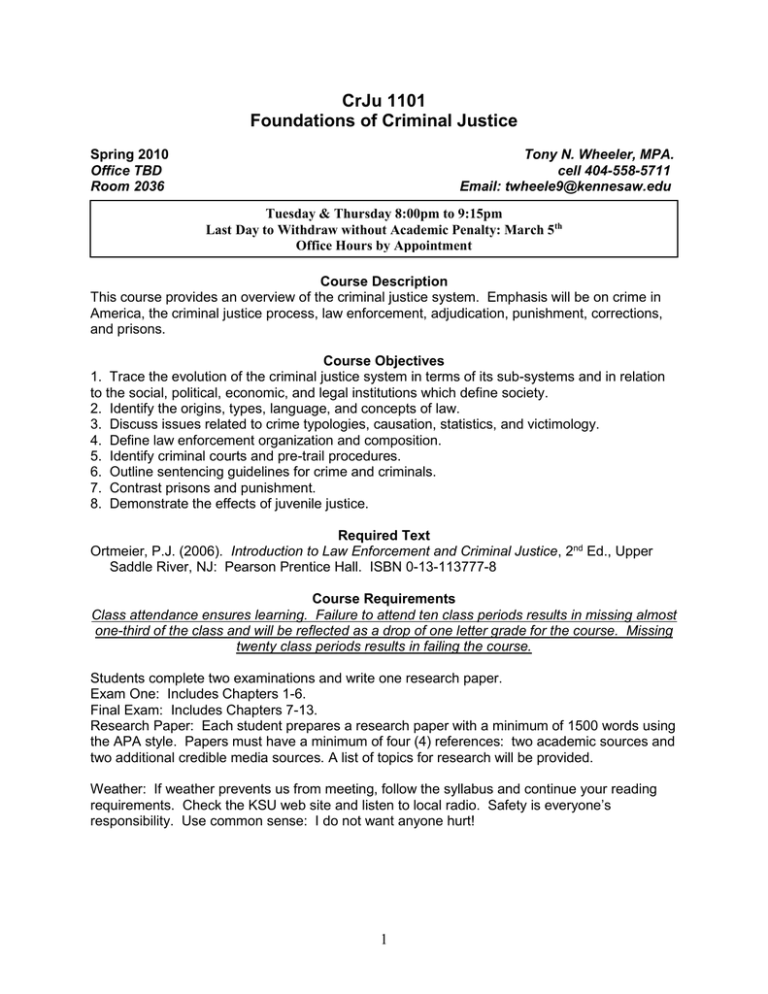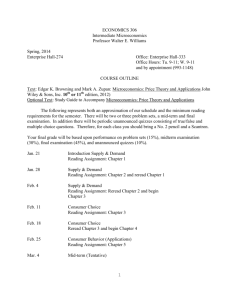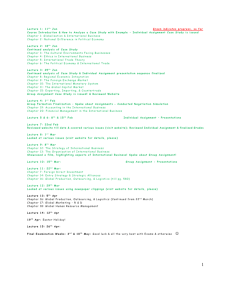
CrJu 1101
Foundations of Criminal Justice
Spring 2010
Office TBD
Room 2036
Nnnnlliw
Tony N. Wheeler, MPA.
cell 404-558-5711
Email: twheele9@kennesaw.edu
Tuesday & Thursday 8:00pm to 9:15pm
Last Day to Withdraw without Academic Penalty: March 5th
Office Hours by Appointment
Course Description
This course provides an overview of the criminal justice system. Emphasis will be on crime in
America, the criminal justice process, law enforcement, adjudication, punishment, corrections,
and prisons.
Course Objectives
1. Trace the evolution of the criminal justice system in terms of its sub-systems and in relation
to the social, political, economic, and legal institutions which define society.
2. Identify the origins, types, language, and concepts of law.
3. Discuss issues related to crime typologies, causation, statistics, and victimology.
4. Define law enforcement organization and composition.
5. Identify criminal courts and pre-trail procedures.
6. Outline sentencing guidelines for crime and criminals.
7. Contrast prisons and punishment.
8. Demonstrate the effects of juvenile justice.
Required Text
Ortmeier, P.J. (2006). Introduction to Law Enforcement and Criminal Justice, 2nd Ed., Upper
Saddle River, NJ: Pearson Prentice Hall. ISBN 0-13-113777-8
Course Requirements
Class attendance ensures learning. Failure to attend ten class periods results in missing almost
one-third of the class and will be reflected as a drop of one letter grade for the course. Missing
twenty class periods results in failing the course.
Students complete two examinations and write one research paper.
Exam One: Includes Chapters 1-6.
Final Exam: Includes Chapters 7-13.
Research Paper: Each student prepares a research paper with a minimum of 1500 words using
the APA style. Papers must have a minimum of four (4) references: two academic sources and
two additional credible media sources. A list of topics for research will be provided.
Weather: If weather prevents us from meeting, follow the syllabus and continue your reading
requirements. Check the KSU web site and listen to local radio. Safety is everyone’s
responsibility. Use common sense: I do not want anyone hurt!
1
Grading
Your final grade reflects your performance on examinations, research/writing requirement, class
participation, and attendance. Your final score is calculated using the following guide:
Mid-Term Exam
02 MAR
Research Paper Due/Presentations 13 APR
Final Examination
06 MAY
33%
33%
33%
Class Activities
Class time is devoted to discussion, lecture, assignments, and reviews. Guest lecturers and
films are a part of the course and exam questions may be taken from the information presented.
Changing circumstances may lead to adjustments in course assignments and scheduling.
Students with Disabilities
Any student with a documented disability needing academic adjustments must notify me as
soon as possible. Verification from KSU disabled student support services is required. All
discussions will remain confidential.
Academic Honesty
The Undergraduate Catalog contains the general policies, regulations of student life, and
provides the Academic Honesty policy. I advise you to read and follow the academic policy. If
you do not understand plagiarism, read the definition. Plagiarism results in a grade of F. The
bottom line: DO THE RIGHT THING.
Class Schedule
Date
Activity
07 JAN
Introductions, syllabus review, and over-view of the textbook.
Discuss Chapter 1
Read Chapters 2-3
12 JAN
Discuss Chapter 1-2
Read Chapter 4
14 JAN
Discuss Chapter 3
Read Chapter 5
19 JAN
Discuss Chapter 3
21 JAN
Guest Speaker
26 JAN
Film
28 JAN
Discuss Chapter 4
Read Chapters 5-6
02 FEB
Discuss Chapter 4-5
2
04 FEB
Discuss Chapter 5
09 FEB
Film
11 FEB
Guest Speaker
16 FEB
Discuss Chapter 6
Read Chapter 7-8
18 FEB
Discuss Chapter 6
23 FEB
Film
25 FEB
Review Chapters 1-6 for Mid-Term
Prepare for Mid-Term
02 MAR
Mid-Term Exam
04 MAR
Discuss Chapter 7
Read Chapter 9
16 MAR
Discuss Chapter 8
Read Chapter 10
18 MAR
Guest Speaker
23 MAR
Discuss Chapter 9
25 MAR
Film
30 MAR
Discuss Chapter 10
Read Chapter 11-12
01 APR
Discuss Chapter 11
06 APR
Film
Read Chapter 13
08 APR
Discuss Chapter 12
13 APR
Discuss Chapter 13
Research Paper Due
15 APR
Student Presentations
20 APR
Student Presentations
22 APR
Student Presentations
27 APR
Student Presentations
3
29 APR
Review for Final Exam
06 MAY
Final Exam
Research Papers
Students research a criminal justice agency (local, state, or federal) or chose a topic from the
following list. The 1500-word paper addresses the following information if the student chooses
to research a CJ agency.
a. The role of the agency in the CJ system.
b. The mission of the agency.
c. Expectations of the agency by the executive branch.
d. How the agency is organized.
e. How the agency operates.
f. Student's overall impression of the agency.
Sources of Information
Agency Web Site
Newspaper Articles
Interviews with members of the agency
Annual Report of the agency
Interviews with the Executive Branch that leads the agency
Public Affairs Officer for the agency
Public Affairs Officer for the executive branch
Writing Style Requirement: APA
Research Topics
Psychological Testing in the Criminal Justice job market: Does it Work?
Women in Law Enforcement: Have we broken the glass ceiling?
The role of the Sheriff
Law Enforcement and Private Security: Will They Work Together?
Analyzing Crime Rates: Liars Figure and Figures Lie?
Accreditation of Law Enforcement Agencies - CALEA
CSI: The Academic Preparation Needed for a Crime Scene Investigator.
Juvenile Justice in Georgia: Does GA measure up with other states?
Corrupt Judges: Who are we calling, “Your Honor?”
Correctional Officer Pay: How does GA compare to other states?
Women Correctional Officers in Male Prisons: Does it work?
Capital Punishment: Who is waiting to die in GA prisons and what did they do?
Successes and Failures of Sheriffs in Georgia
Pay for Law Enforcement Officers: Ways to Improve in Georgia
The Department of Homeland Security: Has it Changed Law Enforcement?
Profiling: Fact or Fiction?
How to Professionalize Georgia Law Enforcement
The Role of Parole
The Gray Bar Motel: An Examination of a Georgia Jail
Loose Lips: Intelligence Gathering in Law Enforcement
Cops Gone Bad: An Examination of Peace Officer Gone Bad
4
Ethics: What is Required by POST and What is Required for Improvement
GA Peace Officer Standards and Training Counsel: The Role of POST
Georgia County Coroners: Task, Conditions, and Standards
Battle of Seattle: November 1999
Buddy Boys: NYPD Subculture
Wickersham Commission
President's Commission on Law Enforcement and the Administration of Justice
Judiciary Act of 1789
Illinois Juvenile Court Act of 1899
5









